Cryptocurrencies, unlike fiat money, are, by definition, more a commodity than a pure currency, giving them compelling appeal for Islamic finance—because renting a commodity is in line with the principles of shariah, unlike lending based on interest.

Blossom, a San Francisco microfinancing startup, moved to Jakarta to offer ethical Islamic financing in the country with the largest population of Muslims in the world—Indonesia. By using bitcoin to make money transfers, Blossom founder and CEO Matthew Joseph Martin believes he has found the perfect vehicle for the global investment community to fund shariah-compliant microfinance loans. (It could also help add much-needed liquidity to the Islaimc finance market-see our coverage here)
It becomes clear that bitcoin is an ideal tool for Islamic finance in general, Martin says, when one considers the five key principles (three prohibitions and two guidelines) that govern shariah-compliant finance:
- No interest/usury
- No excessive uncertainty
- No harm to society
- Ownership of underlying assets
- Profit and loss sharing
“Shariah mandates ownership of underlying assets, and bitcoin [or more generally, cryptocurrency] provides proof of ownership with absolute, mathematical certainty. Shariah also prohibits excessive uncertainty and advocates a clear record of contracts and payments,” says Martin. (Bitcoin’s decentralized “blockchain” ledger technology is a verifiable and unforgeable record showing who sent how much money to whom, when.)
“Profit and loss sharing is especially interesting when you consider the application of ‘smart contracts’ [computer programs that automatically implement the terms of a contract]. For example, consider ‘mudharabah,’ which is one of the preferred modes of shariah financing using a profit-sharing model.” This dates back at least 1,400 years to the prophet Mohammad, who entered into a mudharabah profit-sharing agreement with his first wife, Khadija, before marrying her, to travel and sell merchandise on her behalf, later narrating the story to his companions to illustrate the ideal model of Islamic finance. “Using a bitcoin smart contract it’s possible to enter into a profit-sharing arrangement where the investors and entrepreneur automatically receive payment of profits in the ratio established in the contract,” says Martin. “That’s really exciting.”
In terms of microfinance specifically, he says bitcoin is an extremely fast and cost-effective way to move money internationally. “That’s really critical for crowd-sourced microfinance because it’s important to ensure as much capital as possible is deployed into the field where it’s needed.”
But Martin warns of an important caveat—bitcoin is not an ideal currency in which to denominate a contract. “Given the volatility in the price of bitcoin, a contract stipulated in bitcoin would be excessively uncertain and thus violate one of the key shariah principles. Fortunately this isn’t a problem for us at Blossom because we are using bitcoin as the ‘wire’ to move money around, not as the underlying currency of the contract. Beneficiaries receive local currency [Indonesian rupiah], and investors can invest and cash out into their local currency, such as US dollars, British pounds or euros.”
Blossom’s founders do not believe end users have to understand or even be aware that bitcoin is in play. “Visa cardholders don’t need to know how a debit card network works, and Google users don’t need to know how TCP/IP works. And that’s how we see bitcoin, as a powerful protocol-level tool “under the hood.”
Initial demand has been strong, with Blossom on track to finance more than 200 micro-businesses just within its initial private beta and first year of operation.“Despite that we haven’t opened up the platform to public investment yet, the rate of new investors requesting early access is exceeding 75% month over month. It’s hard that for now we have to say, ‘Sorry, we can’t let you invest just yet, stay tuned,’ but the fact is that financial products and securities are highly regulated. We’re committed to ensuring that we are fully compliant with local laws and regulations in every market that we operate in.”



